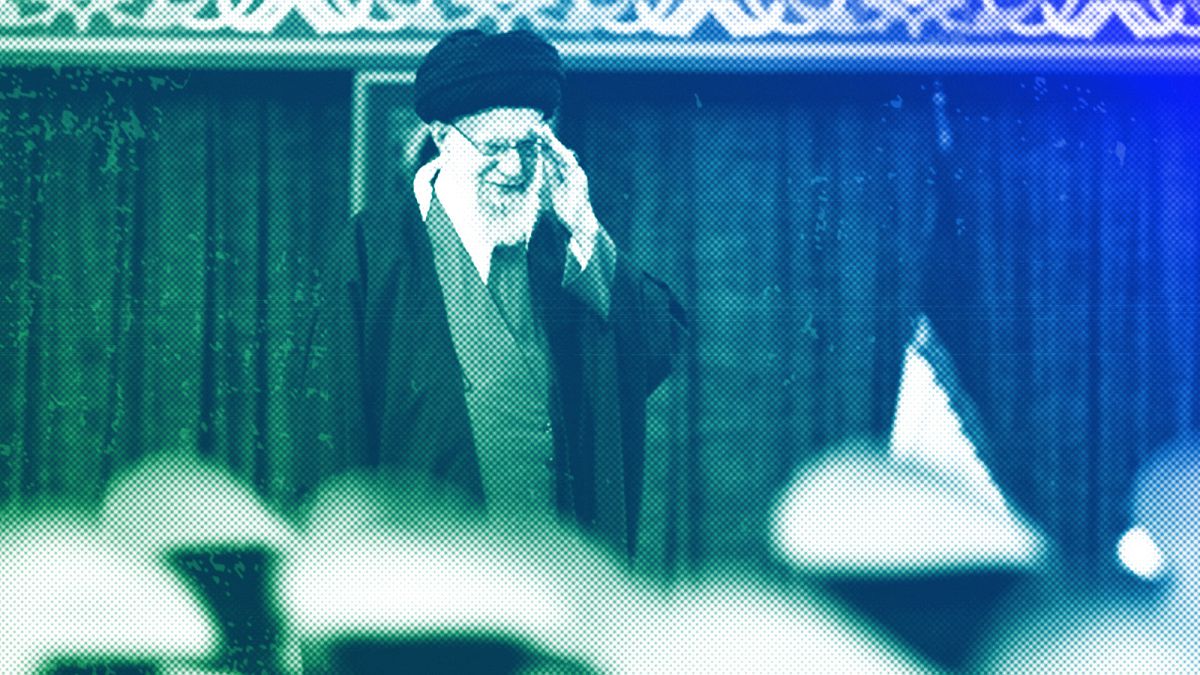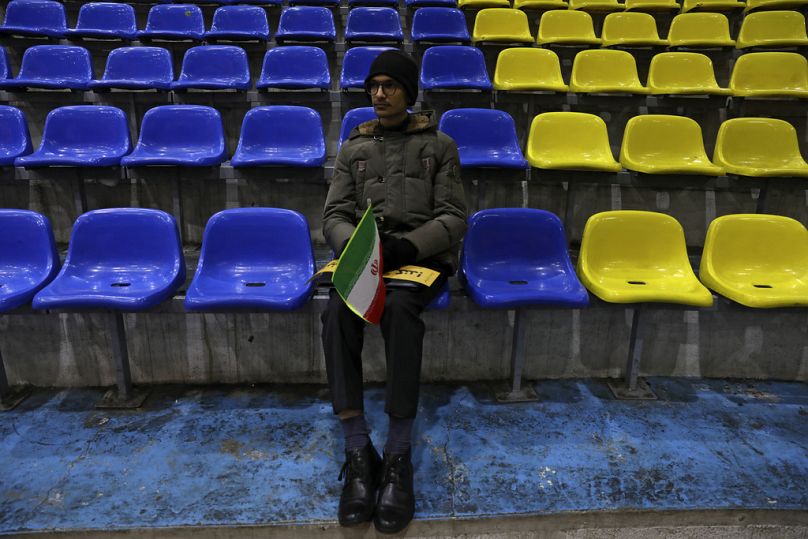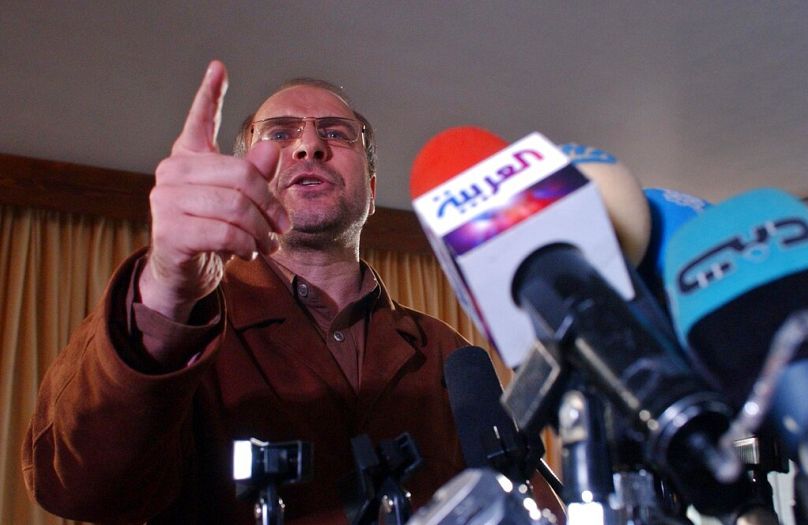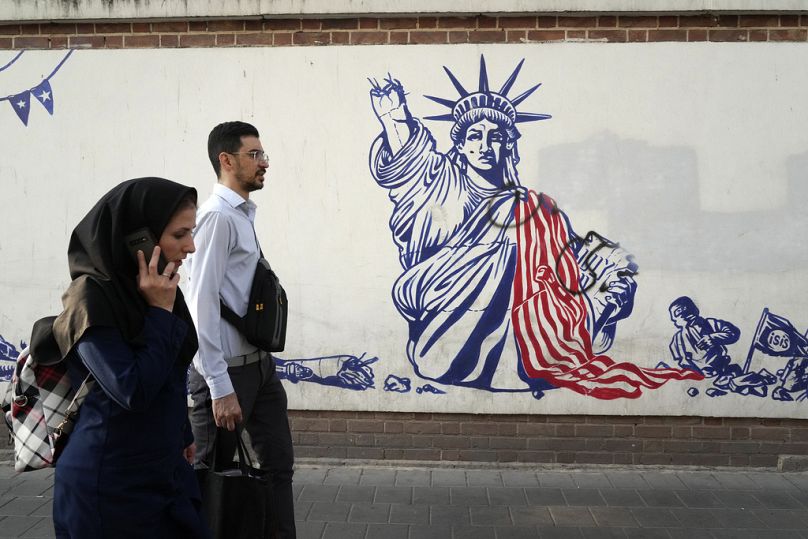The 1 March election is set to be an insider patron-client fight, with various oligarchic clans competing to have the upper-hand insider hand and ultimately a greater slice of the pie in the kleptocratic so-called “holy system” that is the Islamic Republic, Saeid Golkar and Kasra Aarabi write.
Friday marks parliamentary election day in the Islamic Republic of Iran — or so the regime will want the world to believe.
Cue the staged queues lining up at the ballot box ready to deliver their rehearsed script on “Islamic democracy” to international journalists, who will in turn flaunt their “rare and exclusive” reports in Iran.
And while some mainstream media outlets in the West will no doubt fall into the ayatollah’s trap, polling day on 1 March is anything but a free and fair vote.
Of course, this will (hopefully) come as no surprise to many: there are no democratic elections in Iran.
Rather, all candidates are pre-approved by the 84-year-old Supreme Leader Ayatollah Ali Khamenei — who rules with absolute authority as God’s representative on Earth — and the outcome is manufactured to his taste.
But even for the standards of the Islamic Republic, election engineering has been unprecedented this time around.
A patron-client fight is about to unfold
The lack of consequences for the Islamic Republic has meant the previously self-conscious Khamenei no longer cares what the world thinks of his regime.
He has pulled off the veil of electoral “legitimacy” and exposed the naked totalitarianism of his regime.
In the process, we’ve witnessed mass disqualifications and even the boycotting of the vote by some elements of the Islamist left (often wrongly depicted as “reformists”).
In turn, only the Islamist right — the social base of Khamenei and his all-powerful paramilitary force, the Islamic Revolutionary Guard Corps (IRGC) — has been permitted to run for office.
But “electoral” competition, if we can call it that, isn’t between political parties. Instead, 1 March will be an insider patron-client fight, with various oligarchic clans competing to have the upper-hand insider hand and ultimately a greater slice of the pie in the kleptocratic so-called “holy system” that is the Islamic Republic.
Competition is centred on egos, personalities and resources, not political power per se. After all, Iran's legislature, the Majlis, has very little, if any, authority — and the successful candidates will be nothing more than Khamenei’s minions.
So, who are the patron-client networks battling it out?
The infighting of the old guard
In simplest terms, this mafia-like tussle is between the old cohort of Khamenei absolutists and the supreme leader’s younger generation of zealots.
The figureheads of each clan have produced a list of Khamenei pre-approved candidates that will represent their network on the “ballot”.
While some of these patrons have entered the race themselves, others have preferred to guide from afar — and, in doing so, present themselves as less opportunistic.
The old guard all fall under three main figures.
The first is none other than Mohammad Bagher Ghalibaf, the incumbent Majlis speaker who has earned the title of the IRGC’s “most corrupt commander” — a remarkable achievement given the already rampant corruption in the Guard.
Ghalibaf’s most recent corruption scandal took place this week, with leaked documents revealing his son laundering hundreds of thousands of dollars in Western banks.
Until now, Ghalibaf has been continuously bailed out by Khamenei’s close circle each time he has found himself in a corruption scandal. But the latest case may prove too far — and it has provided his opponents with ammo to strike.
Next in line is Gholam-Ali Hadad Adel, a senior adviser to the supreme leader.
Hadad-Adel is very much in the inner circle of Khamenei connected through family relations, with his daughter married to Khamenei’s power-hungry son, Mojtaba — tipped to be the next supreme leader.
Last but certainly not least is fiery hardline cleric Morteza Aghatehrani. Aghatehrani was the student and protégé of the late Ayatollah Mohammad Taqhi Mesbah-Yazdi, the IRGC’s ideological forefather who once issued a fatwa that encouraged acid attacks on women with “improper” hijab.
While this old cohort will be battling out between themselves, their main fight will be with the younger generation of elites who are just as, if not more, radical and extreme. They can be split into two patron-client groups.
The 'kids' are not alright
The first falls under Mehrdad Bazrpash, incumbent Minister for Roads and Urban Development and the former IRGC’s Student Basij Organisation for Sharif University — an entity sanctioned for gross human rights violations.
Bazrpash’s rise took place under Mahmoud Ahmadinejad when at only 27, the former hardline president made him head of “Saipa” and “Pars Khodro”, two of the biggest car manufacturing companies in Iran — all as a reward for his ideological commitment.
While Bazrpash will not be directly participating, he will be fielding candidates under his political faction called “Sharayan”.
And finally, there’s the new crazy on the block: the IRGC-affiliated Ali Akbar Raeifpour.
Raefipour can be best described as a radical antisemitic conspiracy preacher. He has teamed up with Saeed Mohammad — a young and radical IRGC commander who had rising political ambitions that were cut short by the Guard’s old cohort, not least Ghalibaf.
Despite the noise, Raeifpour’s network is unlikely to mount a serious challenge to the old oligarchic elite.
But the fact that this radical preacher, whose extremism was once regarded as being “too irrational” even for segments of the hardline clerical establishment is indicative of the “dumbification” of the regime.
The “dumbification” refers to Khamenei’s systematic effort to replace experience and knowledge for absolute ideological commitment — or what his circle has termed “purification”.
The regime doesn't care
This mafia-like competition between the supreme leader’s older and younger zealots in the Majlis is identical to that of the coming elections for the so-called “Assembly of Experts”, which are also taking place on 1 March.
In theory, this body is responsible for selecting the next supreme leader, but in practice, it is tightly controlled by Khamenei.
In the past five years, as part of his manifesto for the next 40 years, Khamenei has been able to fully personalise power in the Islamic Republic and “purify” its ranks so as to ensure the triumph of his cult of personality across every branch of government.
In doing so, the 84-year-old ayatollah’s goal is to both guarantee a smooth succession process — ousting all but absolutists — and to ensure his hardline Islamist ideology outlives him.
While these patron-client oligarchs will be battling it out for a bigger share of the pie, the overwhelming majority of the Iranian people have paid no attention to the election circus.
According to state-backed figures, which are always inflated, as few as 15% of Iranians in the capital Tehran are planning to actually go to the polls. Not that the regime cares.
Inevitably, there will be only one winner from this week's “vote” — namely, Khamenei himself.
Kasra Aarabi is Director of Islamic Revolutionary Guard Corps (IRGC) research at United Against Nuclear Iran (UANI), specialising in Iranian military and security affairs and Shi’a extremism. He is also a non-resident scholar at the Middle East Institute in Washington, DC. Saeid Golkar is Senior Advisor at United Against Nuclear Iran (UANI) and UC Foundation Associate Professor in the Department of Political Science at the University of Tennessee at Chattanooga.
At Euronews, we believe all views matter. Contact us at view@euronews.com to send pitches or submissions and be part of the conversation.



